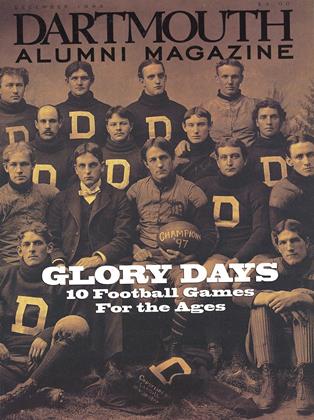For each of us the Dartmouth community meansa slightly different thing.
I WRITE THIS COLUMN sitting in my office on a rainy day in late September. Fall classes have just begun, and there is that magical sense of promise that marks the beginning of the academic year. By the time this column appears, it will be mid-November, the term will be over soon and much will have happened in the intervening months. I expect that the Committee on the Student Life Initiative will have issued its report and we will be beginning a public discussion of the report's recommendations.
About 400 students, faculty and administrators attended the meeting of the Committee on the Student Life Initiative in mid- September. It was a lively presentation and discussion. It was also broadcast live on the campus television network. Trustees Susan Dentzer '77 and Peter Fahey '68, Th '69, provided an update on the committee's activities over the summer. They explained that they had not yet reached any conclusions. But they did share with the audience a list of the values that the committee members had agreed should characterize the social and residential system at Dartmouth. The values listed included, in order of importance:
• Learning • Responsibility • Choice • Inclusiveness • Community • Opportunities • Finding and creating belonging and acceptance
The committee members, despite their diverse backgrounds and opinions on the issues, found that they could agree on these seven fundamental values. I suspect that few of us would disagree with them, although we may disagree on how we might actually encourage such values.
As we discuss the report from the Student Life Committee in the months ahead, we need to think carefully and deeply about the values this academic community should share. We need to think about how we might ensure that the social and residential system at Dartmouth actively affirms these values. And we need to think about exactly what we mean by those two words, "Dartmouth community."
We all think about our community in subjective and personal ways. I reflected on what it meant to me as I considered my activities in the week preceding the beginning of classes. Susan and I went up Moosilauke to the Ravine Lodge and met with one group of students at the conclusion of their first-year trip. I shook hands with each matriculant in my office and told them how I pleased I was that they had chosen Dartmouth. We welcomed the whole class at the First Class Meeting, and the whole community at Convocation, and at the picnic that followed. I also met with the football team and with alumni volunteers here for Leadership Weekend. I welcomed faculty colleagues—new and continuing alike. We also held a reception for graduate students at the President's House.
It was a busy week, but one that underscored for me in so many ways the special character of this place. I met with old friends and made new ones. I spoke with alumni, students and faculty who expressed their love for this college and their desire to preserve particular "Dartmouth community" here for future generations of students. I was impressed by the number of first-year students who had already formed a bond with the College, and I was moved by the upper-class students who spoke passionately about their experiences. For each the Dartmouth community meant a slightly different thing.
At Convocation, the speakers—surgeon and Dartmouth Medical School dean of student affairs Lori Alvord '79 and Student Assembly president Dean Krishna '00 talked about community. As did I. We each, in different ways, challenged students and faculty to think about what the Dartmouth community meant to them and asked them to think about their role within that community. "A community is like an organism, individuals are its cells and the whole is greater than the sum of its parts," noted Alvord She challenged Dartmouth to become "a better version of ourselves" and asked us to imagine new ceremonies and new traditions to help us do this. Krishna told the class of 2003, "They say we are a family here at Dartmouth. We're the best kind; we're people to cradle you when you're upset, and we're people to push you to learn more. We're people who are here to see ourselves grow."
This year will in all likelihood be a year of change for Dartmouth. And while we may disagree on the shape that that change should take, I know, and I am heartened, that there is fundamental agreement on the core values that characterize Dartmouth. We all subscribe to a vision of an academic community committed to excellence in scholarship and teaching, a vision of a place that values, indeed treasures, the past and our sense of community but nonetheless remembers always that we are educating the students of the future, not those of the past.
 View Full Issue
View Full Issue
More From This Issue
-
 Feature
FeatureA Sense of Space
December 1999 By Jon Douglas ’92 -
 Cover Story
Cover StoryBig Green Glory
December 1999 By Jack DeGange -
 Feature
FeatureSoccer Mom
December 1999 By Patricia E. Berry ’81 -
 Feature
FeatureStrange Science
December 1999 By Shirley Lin ’02 -
 Feature
FeatureA Noble Pursuit
December 1999 By Kevin Goldman ’99 -
 Article
ArticleMother Russia's Daughters
December 1999 By Kathleen Burge '89
President James Wright
-
 Article
ArticleWhere Do We Go From Here?
JANUARY 2000 By President James Wright -
 Article
ArticleThe Price of Excellence
MAY 2000 By President James Wright -
 The President
The PresidentA Tragic Loss
Mar/Apr 2001 By President James Wright -
 Article
ArticleVirtue and Achievement
Sept/Oct 2001 By President James Wright -
 Article
ArticleShock Waves
Jan/Feb 2002 By President James Wright -
 Article
ArticleAcademic Aesthetics
Sept/Oct 2002 By President James Wright








